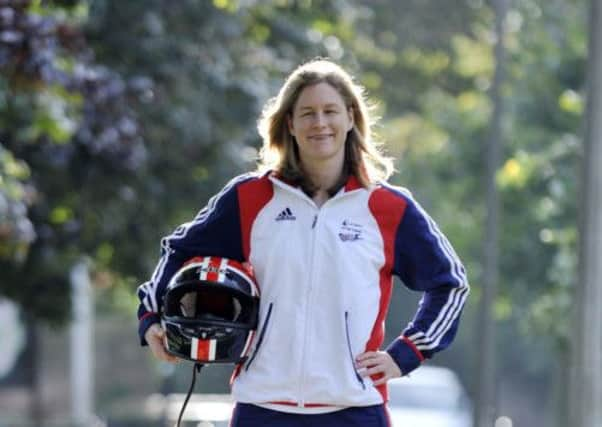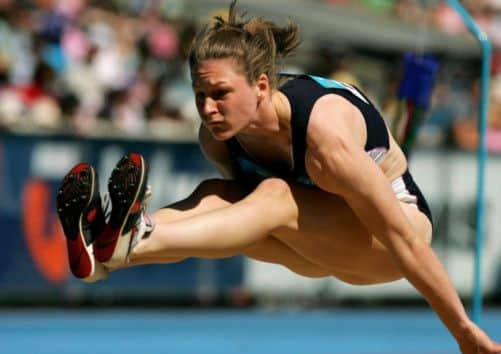Interview: Gillian Cooke on her return from injury


SHE has a versatility that would put triathletes, heptathletes and decathletes to shame. She does the long jump, she plays the role of brakeman in the bobsleigh and she does a neat sideline in rolling with the punches.
Gillian Cooke is consumed by an unending battle to prove herself, to prove her resolve as much as her athleticism. After a crash at the 2010 Winter Olympics that ripped all the flesh from her hip – known as an “internal degloving” – she continued to compete throughout a gruelling period of rehabilitation, even though she could not climb a step without going sideways and had to learn all over again how to walk in a straight line.
Advertisement
Hide AdAdvertisement
Hide AdTwo people at the Sportscotland Institute of Sport worked together to save her career, physiotherapist Fiona Mather and psychologist John Marchant, and they had to patch her up again last January after another crash left her with a squashed vertebrae. Still the punches keep on coming. Recently Cooke was demoted from being brakeman to British No 1 Paula Walker to working with the third-ranked driver Victoria Olaoye, albeit that there is little to choose between Olaoye and No 2 Mica McNeill.


You can imagine the thoughts that must have run through the 31-year-old’s head. Did the perception of her athleticism change in the days when she had to choose the lift over the stairs? The world title she won with Nicola Minichiello was four years ago – is she being sensitively managed out of the system?
None of the above, she insists. Britain expects to have two bobs in Sochi next February, so Cooke is shrugging off the setback and setting her heart on one of them. A second Olympics, after all she has been through, would be “phenomenal”, but there is far more to 2014 than the Greatest (Snowy) Show on Earth. The Commonwealth Games are coming to Glasgow, and Cooke is determined to jump at Hampden.
So how does this champion of resilience banish doubt from her mind when things go against her? And where does she get the courage to hurtle back down that track, knowing that the slightest mistake could consign her to a life of frustrating restriction for any number of months or years afterwards? Finally, doesn’t anyone try to stop her?
“My mum thinks I’m mad,” she confesses over a hot chocolate in Morningside. “She refuses to come and watch any more. She was there at the Olympics when I crashed. I don’t think she saw it and didn’t realise what happened, because all she saw was us sliding to a stop at the finish line, and we were okay. Then they went to watch the rest of the race and the Germans crashed on the next run. She saw the whole thing – the noise is horrendous – and, apparently, she went sheet white when she realised what I had just been through. Yeah, she’s quite keen that I get a proper job and stop putting myself through it.
“But it’s a nice balance, between the people who patch you up and send you back out and the people who say: ‘In 20 years’ time, are you still going to be in one piece?’ That’s always the major concern, and that was the big one with the hip. But because of the support I have, with Fiona and John, I can know that I am OK to go back out there without jeopardising future health.
“I’m more aware of my own vulnerability these days. When you first get into the sport you feel invincible. Then you have a few knocks. . . but it hasn’t really affected my enjoyment of the sport. Coming back to Whistler after that crash, a couple of years later, I was very nervous at the top of the track, and when I had another crash there it almost helped me. I could say, ‘OK, I’ve crashed but nothing bad has happened.’
“There have definitely been times when you want to be honest about where you are, performance wise, but maybe not be completely honest. I’d never do something that was going to jeopardise the result for the team, but you sometimes have to put a brave face on it to stop other people worrying about whether you are going to be OK.
Advertisement
Hide AdAdvertisement
Hide Ad“When it came to the Olympic test event in Sochi, I think the performance team were getting worried about where I was because it was obvious that I wasn’t 100 per cent. Then you start thinking ‘Is the No 2 going to be faster if I am only 90 per cent? Does that mean the next person should be stepping in?’ At that point we had a race-off to decide who should race, and I won that.
“It proved to them that I was the best choice but it also proved to me that I was ready – because you do get that doubt in your mind – ‘should I step aside?’ You don’t want to compromise the other person’s result.”
It goes without saying that if Cooke is not granted a second Olympics, it will give her more time to focus on a potential third Commonwealth Games. If she does go to Russia, she will aim to maintain peak fitness through the back end of the indoor season, then go wherever she needs to go in April and May to get the long jump distance of 6:30m she needs to earn that Team Scotland vest.
“It really is a challenge, but the training for both is very, very similar. I’ve hardly changed my training at all since I was doing long jump. There’s a little bit more upper body in bobsleigh but not a great deal. The major difference is when you peak in the year,” she says.
“To qualify, it’s a really tight timescale. But I did long jump for enough years that the technique is fairly embedded. I’m making plans in the back of my mind, but in terms of focus right now, it’s all on Sochi.
“The fact it’s a home Games is massive. I went to Manchester in 2002 as a 19-year-old. I was two years into my athletics career going: ‘Wow, this is great.’ It was almost a home Games, but actually having the Games in your home country with a Scottish crowd behind you, that’s something you’re never going to get to experience again. That’s my motivation. To put on a Scottish vest and compete in front of a Scottish crowd.”